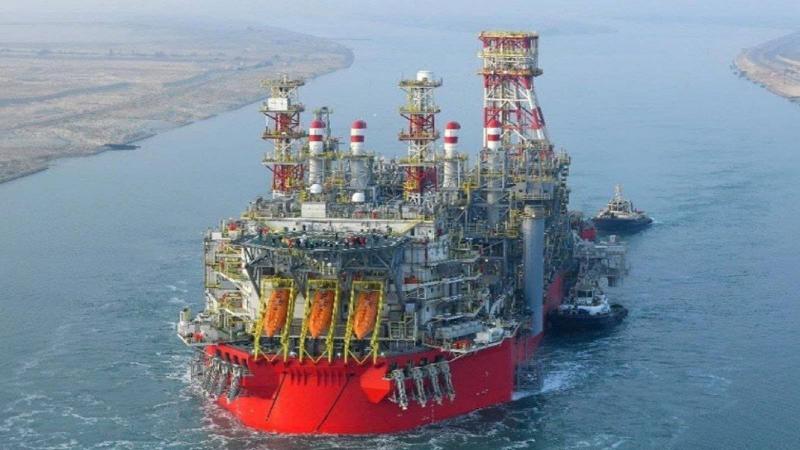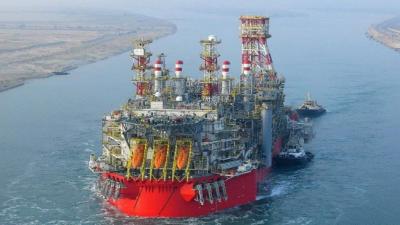The Lebanese government is actively preparing to hasten the dispatch of U.S. mediator Amos Hochstein for the resumption of negotiations regarding the maritime border demarcation between Lebanon and Israel. This follows an Israeli announcement about linking the liquefied gas extracted from the disputed Karish field to avoid pushing the already fragile situation in the region to the brink of explosion. Hezbollah, through Deputy Secretary-General Sheikh Naim Qassem, has indicated that force will be used if necessary.
It was observed that media affiliated with the Free Patriotic Movement attempted to provide weak justifications for ignoring the official Decision 29 that preserves Lebanon's rights, claiming that this line required a decree which was either unavailable or not formally approved by the Cabinet. Information from "Al-Liwaa" indicated that U.S. mediator Hochstein reviewed the current situation regarding the maritime border during a phone call. He is expected to visit the region, although no date has been set. Reports indicate that the Greek ship Energean Power is currently three miles away from the disputed area.
Informed sources have stated that the issue is being monitored through diplomatic means, noting that the bids being made are out of context, and it is clear that the Lebanese position calls for the resumption of negotiations. Sources monitoring the entry of the gas production ship into the Mediterranean explain that the ship is still outside the disputed area based on reports received by the Lebanese authorities from several sources. However, that does not guarantee it won't enter the disputed area later.
The sources revealed that Lebanon is following the ship's topic closely with active friendly nations, but indicated the fragility of the Lebanese stance, as there are multiple factions and varying Lebanese positions regarding this issue. Some countries are demanding that Lebanese parties formulate a unified and cohesive position to assert Lebanon's stance and achieve results in its favor, as having multiple positions weakens the overall Lebanese stance.
Sources noted the lack of response from ambassadors of major countries to Foreign Minister Abdullah Bou Habib’s invitation for a meeting at 11:00 AM yesterday at the Ministry of Foreign Affairs, which resulted in the cancellation of the meeting. Sources viewed this as a negative indicator and a sign of dissatisfaction with official Lebanese handling of this vital and dangerous issue for Lebanon economically.
Thus, Lebanon has begun practical steps to resume indirect negotiations with Israel regarding the demarcation of maritime borders following the arrival of the Greek ship "Energean Power" at the borders of the "Karish" field in preparation for beginning gas and oil exploration. Mediator Hochstein is invited to return to Beirut within days to continue the negotiations, and he decided to make contacts with decision-making capitals and the United Nations to address the situation. Israeli Defense Minister Benny Gantz announced that “the dispute with Lebanon over the border gas field will be resolved through U.S. mediation”.
Al Jazeera quoted Gantz stating that the gas extraction platform in “Karish” is located within Israeli jurisdiction and not in the disputed area with Lebanon. The Israeli Defense Ministry has stated that the U.S. envoy (Hochstein) will intervene to resolve the disagreement with Lebanon regarding the gas field. Official sources told "Al-Liwaa" that the exploration ship has not yet entered the disputed area and is anchored about three miles or slightly more from it, acknowledging the risks associated with entering the disputed area by the Greek company. However, this does not prevent Israel from potentially exploring later in the area it claims rights over, which is larger than the area Lebanon is claiming.
After President Michel Aoun requested that the U.S. ambassador in Lebanon, Dorothy Shea, during her recent visit to Baabda Palace, bring back mediator Amos Hochstein for the resumption of his tasks regarding the maritime border negotiations, Deputy Speaker Elias Bou Saab contacted Hochstein to set a near date for him to visit Lebanon. President Aoun discussed this issue in a phone call with Prime Minister Najib Mikati, who issued a statement clarifying that they discussed steps to be taken to counter the Israeli enemy’s attempts to escalate the situation along the southern maritime borders. Both President Aoun and Mikati agreed to call U.S. mediator Amos Hochstein to visit Beirut to discuss completing the negotiations and working to finish them as soon as possible, to prevent any escalation that would undermine the stability in the region.
A series of diplomatic contacts with major countries and the United Nations will be made to explain Lebanon's position and assert its rights to marine resources, considering that any explorative or extraction activities conducted by Israel in the disputed areas constitute provocation and an act of aggression that threatens international peace and security, obstructing negotiations regarding maritime borders mediated by the U.S. and under the auspices of the United Nations, according to Lebanese correspondence to the United Nations.
In the context of diplomatic moves, Foreign Minister Abdullah Bou Habib visited President Berri yesterday and stated after the meeting that undoubtedly, the arrival of the Greek ship at the "Karish" field represents a significant challenge for us, especially as there is still no demarcation of the borders, and it is unclear whether the drilling is within the occupied Palestinian borders or the disputed Lebanese borders. Thus, the chaos stems from the inability of the U.S. mediator to come, and if the Americans want to be mediators, they must act as such, making shuttle visits to reach an agreement so everyone knows their boundaries and operates within them.
Regarding Hochstein's visit, Bou Habib replied that he had not been informed of the schedule. When asked if there are Lebanese steps that should be taken to halt the occupation, he stated, “We do not want to wage a war, and the ship does not mean that they have the right to operate; however, there is chaos in the region and in Lebanon that is unacceptable. Within these two days, we must know what the Americans will do.”
Minister Bou Habib denied that Lebanon provided guarantees to the Greek company. Regarding the signing of Decree 6433 and the obstacles preventing its signing, he mentioned that the Ministry of Foreign Affairs does not have engineers; rather, the agreement must be between the three presidents, and communication has begun with the U.S. mediator.
Bou Habib met with U.S. Charge d’Affaires Richard Michaels at the Ministry of Foreign Affairs, and according to official information, they “discussed Lebanon's support in voting on some international resolutions.”
### Hezbollah: Force If Necessary...
In the first official position of Hezbollah regarding this issue, Deputy Secretary-General Sheikh Naim Qassem told Reuters that the party is prepared to take actions, including the use of force, against Israeli gas exploration operations in the disputed maritime areas once the Lebanese government announces that Israel has violated Lebanon's maritime borders. He added, “When the Lebanese state declares that Israel is violating our waters and our oil, we are ready to act in pressure, deterrence, and using appropriate means, including force, to prevent Israel from violating our waters and oil.”
In response to a question about whether the Lebanese state would provide a deadline before Hezbollah takes action, Qassem stated, “We do not give a deadline to the Lebanese state; the Lebanese state is above all and dictates its course. We are under the state’s umbrella in such decisions, but we encourage the state to expedite the process. We call on it to set a deadline for itself since this matter cannot remain in limbo. People need to know if there is an aggression or not, and whether this area is disputed or not.”
### Israel Will Not Respond
On the Israeli side, the Israeli newspaper Haaretz reported that the British-Greek energy company, Energean, which has had rights to the Karish gas fields since 2016, set the drilling rig about 80 km west of Haifa the day before yesterday. The report stated, “In the coming days, workers will connect the platform to the gas deposits, and drilling is expected to begin in the next three months.”
It added that the Israeli navy has been securing the rig since its exit from the Suez Canal, and Lebanon claims that Israeli naval vessels are already positioned to protect the rig, even before it is connected to the gas deposits. However, Israel stated previously that any harm done to its gas platforms would be regarded as a declaration of war.
It was revealed that “Israeli defense officials recently informed Lebanon that the new gas platform will begin operations in the area soon and believe there is no intention to attack the rigs during operations. Israel has not officially responded to Lebanese claims and currently has no plans to do so, to avoid legitimizing the allegation that the area is indeed disputed.”
Israeli Defense Minister Benny Gantz stated yesterday that the dispute with Lebanon over offshore natural gas reserves is a civilian matter that will be resolved diplomatically through U.S. mediation. Gantz added in remarks to his parliamentary bloc, “Everything related to the dispute will be resolved within the framework of negotiations between us and Lebanon with U.S. mediation.”
The Israeli Minister of Energy’s spokesperson unveiled that Tel Aviv is working to connect the Karish field via pipelines to the platform (ship) that arrived yesterday, with plans to transport gas via other pipelines from the ship to the Israeli coasts, expecting to complete this operation by next September.




